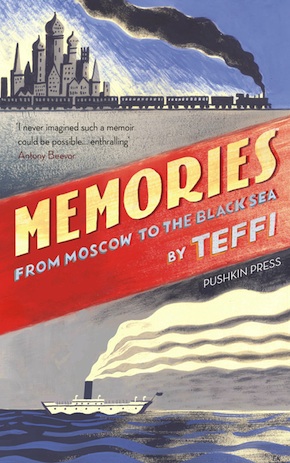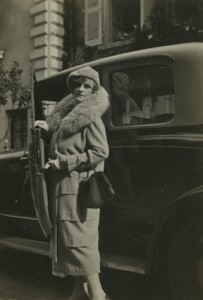Edelweiss on the Black Sea
by Teffi
“A vividly idiosyncratic personal account of the disintegration of Tsarist Russia after the Revolution.” Michael Frayn
How it warms the soul to discover – amid naked rock, amid eternal snow, beside a cold, dead glacier – a tiny velvety flower, an edelweiss. In this realm of icy death it alone is alive. It says, “Don’t believe in the horror that surrounds us both. Look – I’m alive.”
How it warms the soul when, on an unfamiliar street in an alien city, when you are tired and homeless, an unknown woman comes up to you and says, with a delightfully Odessan accent, “Hello! Well, what do you say to my new dress?”
There I was – wandering around Novorossiisk, unable to find shelter – when an unknown lady comes up to me and, in the way of women all over the world, asks, “Well, what do you say to my new dress?”
Noticing my obvious bewilderment, she adds, “I saw you in Kiev. I’m Serafima Semyonovna.”
Reassured by this, I look at the dress. It’s made from what looks like remarkably nasty muslin.
“It’s an excellent dress,” I say. “Very nice.”
“But can you guess what it’s made of ? And do you realize how impossible it is to find any kind of material here? You can’t even get hold of calico – not for love nor money. Well, what you see here is medical gauze that was being sold to make bandages.”
I don’t feel so very surprised. In Petersburg we had made underwear from tracing paper. We soaked it in something or other and ended up with something not far from batiste.
“Of course, this gauze may not be all that strong,” she says, “and it does tend to snag, but it’s cheap, and it comes nice and wide. But you won’t find any now – it’s all been snapped up. The only gauze left is the kind with iodoform. It’s a pretty colour, but it smells rather nasty.”
I express my sympathy.
“You know,” the woman continues, “my niece bought some dressings at the pharmacy – very nice they were too, edged with blue – and she used them as trimmings on a dress just like this one. She sewed some strips along the hem and it really does look very nice indeed. And it’s good hygiene too – thoroughly sterilized.”
O sweet and eternal femininity! Edelweiss, living flower on the icy rock of a glacier! Nothing can break you. I remember how, as the machine guns rattled away, officials told people living in central Moscow to go down into their cellars. And there, while people wept or gritted their teeth, another such edelweiss, another Serafima Semyonovna, had heated her curlers over a small tin in which – since there was no methylated spirit anywhere – she was burning some foul-smelling anti-parasite solution.
And there had been another in Kiev, rushing out – under machine-gun fire – to buy herself some lace for a blouse. And yet another in Odessa, sitting in a hairdresser’s while panicked crowds besieged the ships.
I remember her wise words: “Well yes, everyone’s running for it now. But really! How can you run anywhere without a proper hairdo?”
No doubt, during Pompeii’s last minutes, there had been edelweisses hurrying to fit in a quick pedicure.
I remember searching for a room in Odessa. Here – typhus; there – it had been that terrible Spanish influenza.”
Calmed by these thoughts, I ask this unknown Serafima Semyonovna if she knows of a room anywhere.
“I do know of one, and it’s really not at all bad, but you won’t feel comfortable there.”
“Heavens – what’s comfort got to do with it? I’m hardly in a position to pick and choose!”
“No, I really do advise you to wait a little. There are two typhus patients living there. If they die, there’s a chance the room will be disinfected. You’d be better off waiting.”
I remember searching for a room in Odessa. Here – typhus; there – it had been that terrible Spanish influenza. I had been given a letter of introduction to an engineer who was going to let me have a room in his apartment. On reaching Odessa, I had gone straight to this address. I had rung the bell repeatedly. Finally someone opened the door a crack and asked in a whisper what I wanted. I passed him the letter and explained why I’d come. The door opened a little wider and I saw the miserable, exhausted face of an elderly man. It was the engineer.
“I can’t let you come in,” he said, still in a whisper. “I have got a room, but I must tell you that five days ago I buried my wife and two sons. My third son is dying now. My last son. I’m on my own with him here. I don’t even dare to give you my hand – I may already have the flu myself. You really mustn’t come in.”
Yes, there it had been Spanish influenza; here it was typhus. Serafima Semyonovna launches into the details with gusto: “One young lady goes to church for a friend’s funeral. Some woman asks her, ‘Why are you in such deep mourning?’ She replies, ‘I’m not in mourning, I’m just wearing a black dress.’ But the woman points at her skirt and says, ‘Then why do you have a grey band sewn onto your hem?’ The young lady looks down – and sees her dress is crawling with lice. Well, what do you think happens next? She passes out. They start trying to bring her round, but then they see the telltale signs. Typhus rash – all over her body.”
Cheered by these tales, I go back to look for the Shilka, which has been moved to a distant pier. There are no other ships there. Silent and naked, she stands high in the water, her long gangways now almost vertical.
A quick look is enough to convince me that I won’t be able to get back on board. There aren’t even any footholds on the gangway, which is little more than two narrow planks. I try to take a few steps but my feet slide back down – and beneath me lies a sheer drop into deep water.
Losing heart, I sit down on an iron bollard and try to summon up pleasant thoughts.
Say what you will, I think, I’ve really not done at all badly for myself. It’s a lovely day, there’s a splendid view, no one’s threatening me or driving me away. I’m sitting like a lady on a comfortable bollard, and if I tire of sitting I can stand up for a little while or go for a walk. I can do as I please and no one will dare to stop me.
High up above me, someone is leaning over the ship’s rail. A man with a shaved head is looking down at me.
“Why don’t you come on board?” he shouts.
“How?” I shout back.
“Up the planks!”
“I’m too frightened!”
“Oh!”
The man steps back from the rail. A moment later he is gaily stepping sideways down the planks.
It’s an officer from the engine room.
“So you’re frightened? Take my hand.”
This time it’s even worse. The planks spring up and down. If you take a step with your left foot, the right-hand plank jumps up almost to your knee. A step with your right foot – and up jumps the left plank.
“Tomorrow they’re going to put up a rope,” the officer says reassuringly. “Then there’ll be something to hold on to.”
“But I can hardly wait till tomorrow,” I reply. “Go and get me a stick. Maybe that’ll help.”
Obediently, the officer runs off down the pier. He returns with a long stick.
“Good,” I say. “Now sit here on this bollard and sing me a circus song.”
“I don’t know any circus songs. How about the ‘Tango Argentina’?”
“All right – let’s try.”
“In far-awa-a-a-y sultry Argenti-i-ina!” the officer begins.
“But how does it go after that?”
“For heaven’s sake, don’t stop! Keep singing and keep to the beat!”
I grip the stick with both hands and, making sure it stays horizontal, step onto the planks.
“Where the ski-i-i-es are so-o-o cra-a-a-zy and blu-u-u-e!” sings the officer.
Good grief! What a ridiculous voice. The last thing I need is to start laughing.
Now: Don’t look down. Look straight ahead. Look at the planks. Walk straight. Keep to one plank. Keep humming.
“And the w-i-i-i-men are pretty as pictures!”
Hurrah! I’ve done it. Now I need only lift up one leg, step over the side and…
And then my feet slip backwards. I let go of the stick and close my eyes. But there is someone above me. Firm hands grip my shoulders. I lean forward, seize hold of the ship’s rail, and step on board.
When I told him I hadn’t yet found a room, the diminutive captain suggested that I stay on board as a guest. I could have a small cabin at a very cheap price and eat, along with the crew, “from the common pot.” And in time, no doubt, it would become clear where the Shilka was going next. If it truly was Vladivostok, then I was welcome to stay on board.
This was just what I needed. I thanked the kind captain with all my heart.
So began our strange, dreary life on a steamer moored to a long, white, empty pier.
No one knew when we would set sail, or what our destination would be.
Extracted from Memories: From Moscow to the Black Sea, translated by Robert and Elizabeth Chandler, Anne Marie Jackson and Irina Steinberg.
 Teffi (Nadezhda Alexandrovna Lokhvitskaya) was a phenomenally popular writer in pre-revolutionary Russia – a favourite of both Tsar Nicholas II and Vladimir Lenin. She was born in 1872 into a prominent St Petersburg family and emigrated from Bolshevik Russia in 1919, eventually settling in Paris, where she became an important figure in the émigré literary scene. A master of the short form, in her lifetime Teffi published countless stories, plays and feuilletons. Memories is published by Pushkin Press, along with Rasputin and Other Ironies and the story collection Subtly Worded. Read more.
Teffi (Nadezhda Alexandrovna Lokhvitskaya) was a phenomenally popular writer in pre-revolutionary Russia – a favourite of both Tsar Nicholas II and Vladimir Lenin. She was born in 1872 into a prominent St Petersburg family and emigrated from Bolshevik Russia in 1919, eventually settling in Paris, where she became an important figure in the émigré literary scene. A master of the short form, in her lifetime Teffi published countless stories, plays and feuilletons. Memories is published by Pushkin Press, along with Rasputin and Other Ironies and the story collection Subtly Worded. Read more.

